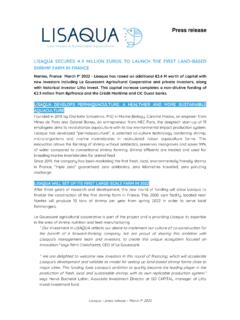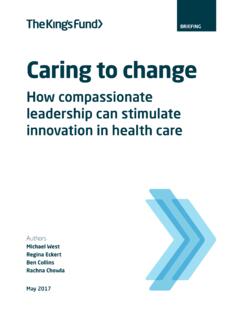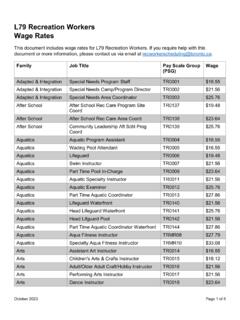Transcription of Geography Optional Syllabus for UPSC 2021-22
1 UPSC Geog Optional Syllabus Geography Optional Syllabus for UPSC 2021-22 Copyright Aspire IAS All rights are reserved. No part of this document may be reproduced, stored in a retrieval system or transmitted in any form or by any means, electronic, mechanical, photocopying, recording or otherwise, without prior permission of Aspire lAS. UPSC Geog Optional Syllabus PAPER I: Principles of Geography Paper I is divided in Physical Geography and Human Geography . Part 1: Physical Geography : Part I of Paper I of UPSC IAS Geography Optional consists of Physical Geography which includes Geomorphology, Climatology, Oceanography, Biogeography and Environment Geography .
2 1. Geomorphology: Geomorphology is the study of landforms, their processes, form and sediments at the surface of the Earth (and sometimes on other planets). Study includes looking at landscapes to work out how the earth surface processes, such as air, water and ice, can mould the landscape. This Syllabus includes the following subtopics 1. Factors controlling landform development; 2. Endogenetic and exogenetic forces; 3. Origin and evolution of the earth s crusts; 4.
3 Fundamentals of geomagnetism; 5. Physical conditions of the earth s interior; 6. Geosynclines; 7. Continental drift; 8. Isostasy; 9. Plate tectonics; 10. Recent views on mountain building; 11. Volcanicity; 12. Earthquakes and Tsunamis; 13. Concepts of geomorphic cycles and Land scape development; 14. Denudation chronology; 15. Channel morphology; 16. Erosion surfaces; 17. Slope development; 18. Applied Geomorphology; 19. Geomorphology, economic geology and environment. UPSC Geog Optional Syllabus 2.
4 Climatology: Climatology or climate science is the scientific study of climate, scientifically defined as weather conditions averaged over a period of time. Following are the subtopics: 1. Temperature and pressure belts of the world; 2. Heat budget of the earth; 3. Atmospheric circulation; 4. Atmospheric stability and instability. 5. Planetary and local winds; 6. Monsoons and jet streams; 7. Air masses and Fronts; 8. Temperate and tropical cyclones; 9. Types and distribution of precipitation; 10.
5 Weather and Climate; 11. Koppen s Thornthwaite s and Trewartha s classification of world climate; 12. Hydrological cycle; 13. Global climatic change, and role and response of man in climatic changes 14. Applied climatology and 15. Urban climate. 3. Oceanography: Oceanography is a science that deals with the oceans and includes the delimitation of their extent and depth, the physics and chemistry of their waters, marine biology, and the exploitation of their resources.
6 It includes 1. Bottom topography of the Atlantic, Indian and Pacific Oceans; 2. Temperature and salinity of the oceans; 3. Heat and salt budgets, 4. Ocean deposits; 5. Waves, currents and tides; 6. Marine resources; 7. Biotic, mineral and energy resources; UPSC Geog Optional Syllabus 8. Coral reefs coral bleaching; 9. Sea-level changes; 10. Law of the sea and 11. Marine pollution. 4. Biogeography: Biogeography is the study of the distribution of species and ecosystems in geographic space and through geological time.
7 It includes 1. Genesis of soils; 2. Classification and distribution of soils; 3. Soil profile; 4. Soil erosion, 5. Degradation and conservation; 6. Factors influencing world distribution of plants and animals; 7. Problems of deforestation and conservation measures; 8. Social forestry, agro-forestry; 9. Wild life; 10. Major gene pool centres. 5. Environmental Geography : Environmental Geography is the branch of Geography that describes the spatial aspects of interactions between humans and the natural world.
8 It includes: 1. Principle ecology; 2. Human ecological adaptations; 3. Influence of man on ecology and environment; 4. Global and regional ecological changes and imbalances; 5. Ecosystem their management and conservation; 6. Environmental degradation, management and conservation; 7. Biodiversity and sustainable development; 8. Environmental policy; 9. Environmental hazards and remedial measures; 10. Environmental education and legislation. UPSC Geog Optional Syllabus Part II: Human Geography 1.
9 Perspectives in Human Geography : 1. Areal differentiation; 2. Regional synthesis; 3. Dichotomy and dualism; 4. Environmentalism; 5. Quantitative revolution and locational analysis; 6. Radical, behavioural, human and welfare approaches; 7. Languages, religions and secularisation; 8. Cultural regions of the world; 9. Human development index. 2. Economic Geography : 1. World economic development: measurement and problems; 2. World resources and their distribution; 3. Energy crisis; 4. The limits to growth; 5.
10 World agriculture: typology of agricultural regions; 6. Agricultural inputs and productivity; 7. Food and nutritions problems; 8. Food security; 9. Famine: causes, effects and remedies; 10. World industries: location patterns and problems; 11. Patterns of world trade. 3. Population and Settlement Geography : 1. Growth and distribution of world population; 2. Demographic attributes; 3. Causes and consequences of migration; 4. Concepts of over-under-and optimum population; 5. Population theories, world population problems and policies, Social well-being and quality of life; UPSC Geog Optional Syllabus 6.




